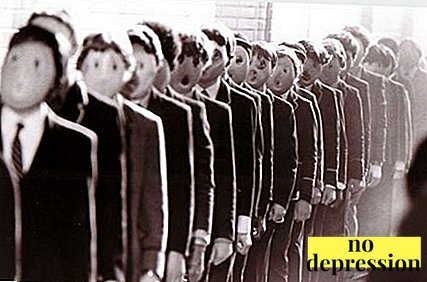In psychology, there is often such a thing as "Cognitivism".
What is it? What does this term mean?
Explanation of the term

Cognitivism is direction in psychology, according to which individuals do not just mechanically react to events from the outside or internal factors, but use the power of reason for this.
His theoretical approach is to understand how thinking is arranged, how decryption of incoming information occurs, and how it is organized to make decisions or perform everyday tasks.
Research is related to human cognitive activity, and cognitivism is based on mental activity rather than behavioral responses.
Cognitive - what is it in simple words? Cognitive - A term denoting a person's ability to mental perception and processing of external information.
Concept of cognition
The main concept in cognitivism is cognition, which is the cognitive process itself or a set of mental processes, which includes perception, thinking, attention, memory, speech, awareness, etc.
That is, such processes that are associated with processing information in brain structures and its subsequent processing.
What does cognitive mean?
When characterize something like "Cognitive" - what do they mean? Which one?

Cognitive means somehow related to cognition, thinking, consciousness and functions of the brain, providing input knowledge and information, the formation of concepts and operating them.
For a better understanding, consider a few definitions directly related to cognitivism.
Some definitions for example
What does the word "cognitive" mean?
Under cognitive style understand relatively stable individual characteristics of how different people go through the process of thinking and understanding, how they perceive, process information and remember it, as well as the method of solving problems or problems that an individual chooses.
This video understands cognitive styles:
What is a cognitive behavior?
The cognitive behavior of a person is a thought and a view that is inherent in a greater degree to this particular individual.
These are behavioral reactions that arise on a certain situation after processing and organizing information.
Cognitive component - This is a set of different installations in relation to itself. It includes the following elements:
- self-image;
- self-esteem, that is, the assessment of this view, which may have a different emotional color;
- potential behavioral reaction, that is, possible behavior based on self-image and self-esteem.

Under cognitive model understand the theoretical model that describes the structure of knowledge, the relationship between concepts, indicators, factors, observations, and also reflects how information is received, stored and used.
In other words, it is an abstraction of the psychological process, reproducing the key points in the opinion of this researcher for his research.
The video demonstrates the classic cognitive model:
Cognitive perception - It is an intermediary between the event and your perception of it.
Such perception is called one of the most effective ways of dealing with psychological stress. That is, it is your assessment of the event, the reaction of the brain to it and the formation of a meaningful behavioral reaction.
The phenomenon in which the ability of an individual to absorb and comprehend what is happening from the external environment is limited is called cognitive deprivation. It includes the lack of information, its variability or randomness, lack of orderliness.
Because of it, there are obstacles to productive behavioral reactions in the outside world.
Thus, in professional activities, cognitive deprivation can lead to errors and hinder the adoption of effective decisions. And in everyday life it can be the result of false conclusions about individuals or events.
Empathy - is the ability to empathize with a person, to understand the feelings, thoughts, goals and aspirations of another individual.

It is divided into emotional and cognitive.
And if the first is based on emotions, then the second is based on intellectual processes, mind.
TO the most difficult types of learning refer cognitive.
Thanks to it, the functional structure of the environment is formed, that is, the relationships between its components are extracted, after which the results are transferred to reality.
Cognitive learning includes observation, rational and psycho-nervous activity.
Under cognitive apparatus they understand the internal resources of knowledge, thanks to which intellectual structures are formed, the structure of thinking.
Cognitive flexibility is the ability of the brain to move smoothly from one thought to another, as well as to think about several things at once at the same time.
It also includes the ability to adapt behavioral responses to new or unexpected situations. Cognitive flexibility is of great importance when learning and solving complex problems.
It allows you to receive information from the environment, monitor its variability and adjust the behavior in accordance with the new requirements of the situation.

Cognitive component usually closely related to the “i” concept.
This is the representation of the individual about himself and a set of certain characteristics, which, in his opinion, he possesses.
These beliefs may have different meanings and change over time. The cognitive component can be based both on objective knowledge, and on any subjective opinion.
Under cognitive properties understand such properties that characterize the abilities available to the individual, as well as the activity of cognitive processes.
Cognitive factors has an important role for our mental state.
These include the ability to analyze one’s own state and environmental factors, evaluate past experience and make predictions for the future, determine the balance between existing needs and their level of satisfaction, monitor the current state and situation.
What is “I-Concept”? A clinical psychologist will explain in this video:
Cognitive evaluation It is an element of the emotional process, which includes the interpretation of the event, as well as its own and other people's behavior based on the attitude to values, interests, needs.
In the cognitive theory of emotion, it is noted that cognitive assessment determines the quality of emotions experienced and their strength.
Cognitive features These are the specific characteristics of the cognitive style associated with the individual's age, gender, place of residence, social status and environment.
Under cognitive experience understand mental structures that ensure the perception of information, its storage and ordering. They allow the psyche to further reproduce sustainable aspects of the environment and accordingly respond to them promptly.

Cognitive rigidity They call the inability of an individual to change his or her own perception of the environment and ideas about it when receiving additional, sometimes contradictory, information and the emergence of new situational requirements.
Cognitive knowledge engaged in the search for methods and ways to improve the efficiency, improve human mental activity.
With its help, it becomes possible to form a multifaceted, successful, thinking personality. Thus, cognitive knowledge is a tool for the formation of the individual's cognitive abilities.
To one of the features of common sense cognitive biases. Individuals often reason about something or make decisions that are suitable in some cases, but mislead in others.
They represent the individual's bias, biased bias in the assessment, a tendency to unjustified conclusions as a result of insufficient information or unwillingness to take note of it.
In this way, cognitivism comprehensively considers human mental activity, explores thinking in various changeable situations. This term is closely related to cognitive activity and its effectiveness.
Learn how to handle cognitive biases in this video:



